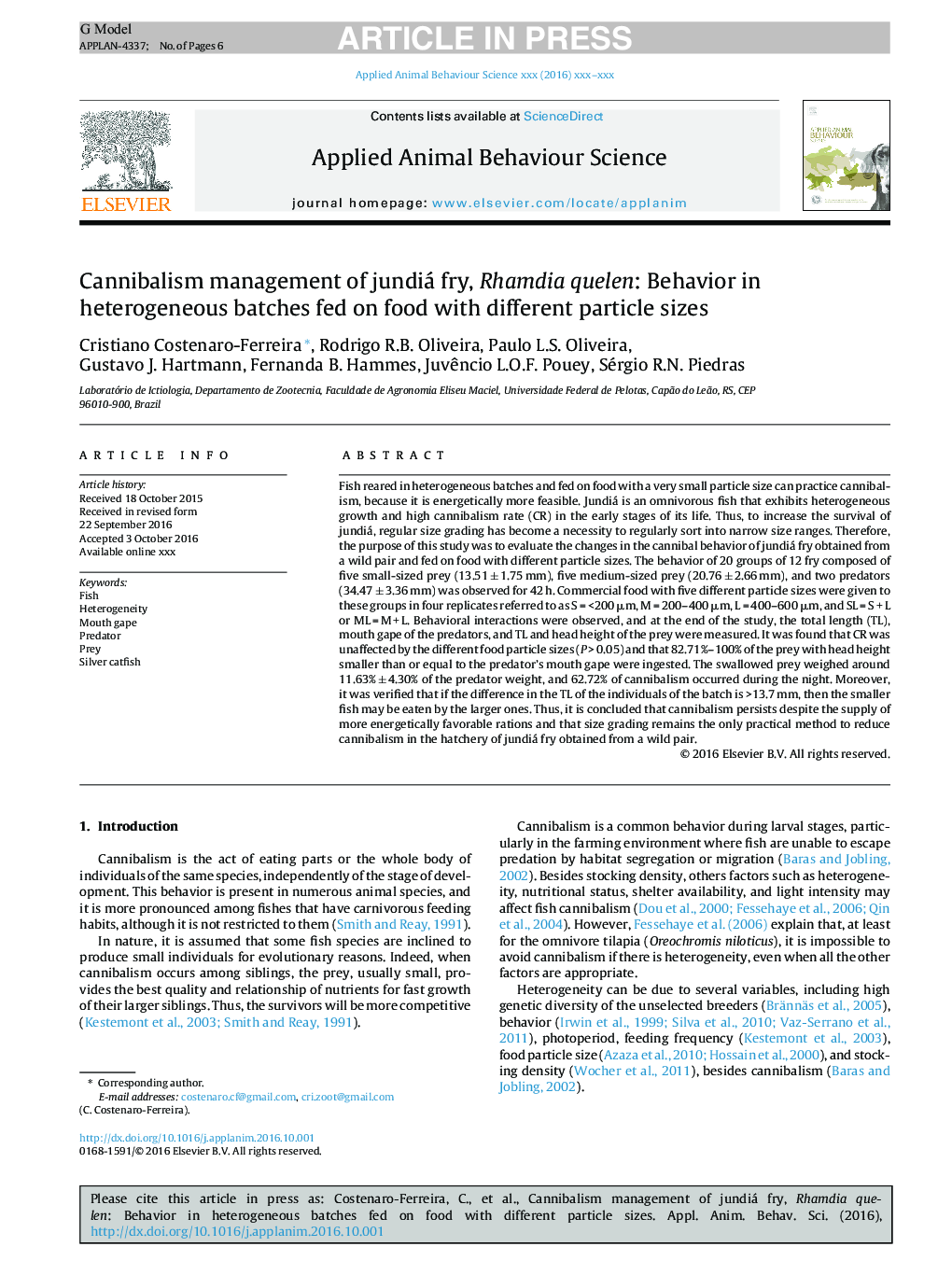| کد مقاله | کد نشریه | سال انتشار | مقاله انگلیسی | نسخه تمام متن |
|---|---|---|---|---|
| 5763369 | 1625321 | 2016 | 6 صفحه PDF | دانلود رایگان |
عنوان انگلیسی مقاله ISI
Cannibalism management of jundiá fry, Rhamdia quelen: Behavior in heterogeneous batches fed on food with different particle sizes
دانلود مقاله + سفارش ترجمه
دانلود مقاله ISI انگلیسی
رایگان برای ایرانیان
کلمات کلیدی
موضوعات مرتبط
علوم زیستی و بیوفناوری
علوم کشاورزی و بیولوژیک
علوم دامی و جانورشناسی
پیش نمایش صفحه اول مقاله

چکیده انگلیسی
Fish reared in heterogeneous batches and fed on food with a very small particle size can practice cannibalism, because it is energetically more feasible. Jundiá is an omnivorous fish that exhibits heterogeneous growth and high cannibalism rate (CR) in the early stages of its life. Thus, to increase the survival of jundiá, regular size grading has become a necessity to regularly sort into narrow size ranges. Therefore, the purpose of this study was to evaluate the changes in the cannibal behavior of jundiá fry obtained from a wild pair and fed on food with different particle sizes. The behavior of 20 groups of 12 fry composed of five small-sized prey (13.51 ± 1.75 mm), five medium-sized prey (20.76 ± 2.66 mm), and two predators (34.47 ± 3.36 mm) was observed for 42 h. Commercial food with five different particle sizes were given to these groups in four replicates referred to as S = <200 μm, M = 200-400 μm, L = 400-600 μm, and SL = S + L or ML = M + L. Behavioral interactions were observed, and at the end of the study, the total length (TL), mouth gape of the predators, and TL and head height of the prey were measured. It was found that CR was unaffected by the different food particle sizes (P > 0.05) and that 82.71%-100% of the prey with head height smaller than or equal to the predator's mouth gape were ingested. The swallowed prey weighed around 11.63% ± 4.30% of the predator weight, and 62.72% of cannibalism occurred during the night. Moreover, it was verified that if the difference in the TL of the individuals of the batch is >13.7 mm, then the smaller fish may be eaten by the larger ones. Thus, it is concluded that cannibalism persists despite the supply of more energetically favorable rations and that size grading remains the only practical method to reduce cannibalism in the hatchery of jundiá fry obtained from a wild pair.
ناشر
Database: Elsevier - ScienceDirect (ساینس دایرکت)
Journal: Applied Animal Behaviour Science - Volume 185, December 2016, Pages 146-151
Journal: Applied Animal Behaviour Science - Volume 185, December 2016, Pages 146-151
نویسندگان
Cristiano Costenaro-Ferreira, Rodrigo R.B. Oliveira, Paulo L.S. Oliveira, Gustavo J. Hartmann, Fernanda B. Hammes, Juvêncio L.O.F. Pouey, Sérgio R.N. Piedras,